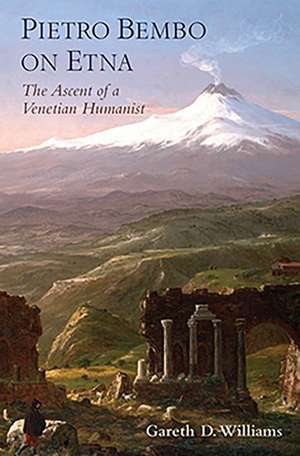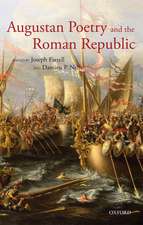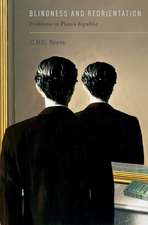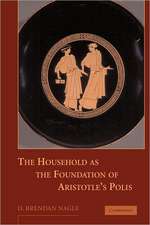Pietro Bembo on Etna: The Ascent of a Venetian Humanist
Autor Gareth D. Williamsen Limba Engleză Paperback – 6 iul 2022
| Toate formatele și edițiile | Preț | Express |
|---|---|---|
| Paperback (1) | 235.06 lei 10-16 zile | |
| Oxford University Press – 6 iul 2022 | 235.06 lei 10-16 zile | |
| Hardback (1) | 562.41 lei 10-16 zile | |
| Oxford University Press – 31 aug 2017 | 562.41 lei 10-16 zile |
Preț: 235.06 lei
Preț vechi: 247.33 lei
-5% Nou
Puncte Express: 353
Preț estimativ în valută:
44.98€ • 47.08$ • 37.44£
44.98€ • 47.08$ • 37.44£
Carte disponibilă
Livrare economică 28 februarie-06 martie
Preluare comenzi: 021 569.72.76
Specificații
ISBN-13: 9780197603185
ISBN-10: 0197603181
Pagini: 440
Ilustrații: 16 full color illustrations
Dimensiuni: 236 x 156 x 31 mm
Greutate: 0.68 kg
Editura: Oxford University Press
Colecția OUP USA
Locul publicării:New York, United States
ISBN-10: 0197603181
Pagini: 440
Ilustrații: 16 full color illustrations
Dimensiuni: 236 x 156 x 31 mm
Greutate: 0.68 kg
Editura: Oxford University Press
Colecția OUP USA
Locul publicării:New York, United States
Recenzii
Pietro Bembo on Etna: The Ascent of a Venetian Humanist makes an indispensable contribution to our understanding of Venetian humanism, while paving the way for future explorations of Renaissance literature at the intersection of classical antiquity, print technology, and transformations in spatiality and visual culture.
Pietro Bembo on Etna is an ambitious book that accomplishes a great deal. Classicists and early modernists alike will benefit from Williams's brilliant rendering of De Aetna, his meticulous tracing of the "Etna Idea," and his impressive leveraging of several scholarly literatures to excavate the poetic, scientific, and historical layers of meaning in Bembo's brief but riveting dialogue.
Anchored in scholarly authority and...masterfully argued with extraordinary sagacity... Essential for those who love the Italian Renaissance and want to know more about one of its fundamental figures.
Williams ... moves deftly from one episode or argument to the next. He nails down each with a philologist's precision, while still offering a critic's imaginative interpretation.
[Williams'] volume is a carefully-crafted delight which interweaves rigorous scholarship on the Classical intertexts and Humanist influences of Bembo's De Aetna with a beautiful thread detailing the painfully human relationship between Bembo father and son.
In both presentation and content, then, this volume deserves whole-hearted recommendation. [Williams] demonstrates a magisterial command of a wide range of scholarly concerns, from the history of mountaineering to the complex political and scholarly landscape of Quattrocento Venice. Set against this broad backdrop of interests, the volume is also clearly rooted in a deep and confident command of the extensive and multi-lingual literature concerning Pietro Bembo in particular. Part-biography, part-critical edition, interspersed with surveys of art, printing and Classical volcanic literature, this volume is sure to become a well-thumbed reference for students and researchers across a range of fields.
this rich and intelligent study uses [De Aetna] as a consistently enticing way into Bembo's intellectual world. ... This is unquestionably the definitive work on the De Aetna in any language, but it is also indispensable for readers with interests in any aspect of Bembo's own achievement or the early-16th-century cultural innovations in whose development and promotion Bembo played such a vital part. A valuable resource for scholars interested in Italian, neo-Latin, and/or Renaissance literary and cultural studies. ... Summing Up: Essential. Graduate students, researchers, faculty.
This book offers the fullest reading available of De Aetna, a dialogue in which Pietro Bembo, an important figure in the history of Italian Renaissance literature, recounts an ascent that he had made of Mount Etna in Sicily. In clear, engaging prose, Williams shows how this often-misunderstood work marks both a turning point in the development of Italian Renaissance humanism and a key step in the self-fashioning of its famous author, in which Bembo presents to the world the image of himself that he wanted to have disseminated. Highly recommended.
This captivating, wide-ranging study of Pietro Bembo's volcanic dialogue takes us from one end of Italy to the other, from the canals of Venice to the edge of Mount Etna's perpetually smoking crater, moving deftly through subjects that range from the history of mountaineering, the history of print, and the beginnings of empirical science, to a sensitive, sympathetic portrayal of the complex relationship between a remarkable father and a remarkable son. A reader's delight!
Pietro Bembo on Etna is an ambitious book that accomplishes a great deal. Classicists and early modernists alike will benefit from Williams's brilliant rendering of De Aetna, his meticulous tracing of the "Etna Idea," and his impressive leveraging of several scholarly literatures to excavate the poetic, scientific, and historical layers of meaning in Bembo's brief but riveting dialogue.
Anchored in scholarly authority and...masterfully argued with extraordinary sagacity... Essential for those who love the Italian Renaissance and want to know more about one of its fundamental figures.
Williams ... moves deftly from one episode or argument to the next. He nails down each with a philologist's precision, while still offering a critic's imaginative interpretation.
[Williams'] volume is a carefully-crafted delight which interweaves rigorous scholarship on the Classical intertexts and Humanist influences of Bembo's De Aetna with a beautiful thread detailing the painfully human relationship between Bembo father and son.
In both presentation and content, then, this volume deserves whole-hearted recommendation. [Williams] demonstrates a magisterial command of a wide range of scholarly concerns, from the history of mountaineering to the complex political and scholarly landscape of Quattrocento Venice. Set against this broad backdrop of interests, the volume is also clearly rooted in a deep and confident command of the extensive and multi-lingual literature concerning Pietro Bembo in particular. Part-biography, part-critical edition, interspersed with surveys of art, printing and Classical volcanic literature, this volume is sure to become a well-thumbed reference for students and researchers across a range of fields.
this rich and intelligent study uses [De Aetna] as a consistently enticing way into Bembo's intellectual world. ... This is unquestionably the definitive work on the De Aetna in any language, but it is also indispensable for readers with interests in any aspect of Bembo's own achievement or the early-16th-century cultural innovations in whose development and promotion Bembo played such a vital part. A valuable resource for scholars interested in Italian, neo-Latin, and/or Renaissance literary and cultural studies. ... Summing Up: Essential. Graduate students, researchers, faculty.
This book offers the fullest reading available of De Aetna, a dialogue in which Pietro Bembo, an important figure in the history of Italian Renaissance literature, recounts an ascent that he had made of Mount Etna in Sicily. In clear, engaging prose, Williams shows how this often-misunderstood work marks both a turning point in the development of Italian Renaissance humanism and a key step in the self-fashioning of its famous author, in which Bembo presents to the world the image of himself that he wanted to have disseminated. Highly recommended.
This captivating, wide-ranging study of Pietro Bembo's volcanic dialogue takes us from one end of Italy to the other, from the canals of Venice to the edge of Mount Etna's perpetually smoking crater, moving deftly through subjects that range from the history of mountaineering, the history of print, and the beginnings of empirical science, to a sensitive, sympathetic portrayal of the complex relationship between a remarkable father and a remarkable son. A reader's delight!
Notă biografică
Gareth D. Williams is Violin Family Professor of Classics, Columbia University. His previous OUP publications include The Cosmic Viewpoint (2016) and Roman Reflections (with Katharina Volk, 2015).












